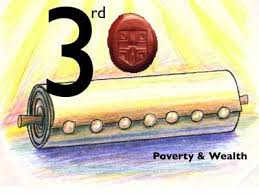THE BLACK HORSE
SPIRIT OF FAMINE
Revelation 6:5-6
"And when he had opened the third seal, I heard the third beast say, Come and see. And I beheld, and lo a black horse; and he that sat on him had a pair of balances in his hand. And I heard a voice in the midst of the four beasts say, A measure of wheat for a penny, and three measures of barley for a penny; and see thou hurt not the oil and the wine."
Recap: End-time events begin with the opening of a scroll locked with seven seals. Jesus alone can open these seals. The opening of the first four seals brings four angels riding horses; these are commonly referred to as the "four horsemen of the apocalypse." People on earth cannot see these angels or their horses. The Four Horsemen, each with their own specific mission. (Revelation 6:1 – 8:1)
The Spirit of FAMINE causes a catastrophic food
shortage. Wheat and barley are basic food requirements; people are paying their
entire salary to feed themselves. Further,
the meaning of the third seal-vision is to be concluded consulting to the same standard
as that of the second. The black color of the horse designates not the
grief of those who have been afflicted by the plagues indicated by the entire
image of the horseman, especially not the grief of the Church over
heresy, as it is symbolized by the horse
and horseman; but the black color must correspond to the destructive
character of the image of the horseman itself. Yet an indication that the
figure appearing therein is one of a plague. The 'rider' on the Black Horse, is
the Antichrist.
- "Black"
is the color for famine (Jer. 14:1-3; Lam. 4:8-9; 5:10). In the
Bible, wheat is measured and not weighed. Balances are used to
weigh precious things, but here a balance is used for measuring
wheat. Hence, not a single grain is missed. "A choenix of wheat
for a denarius." A denarius is a person’s wages for one
day’s labor. It is only one person’s wage; in Matthew 20:2 the pay
for a laborer is a denarius a day. "Three choenixes of barley for
a denarius." Normally, the ratio of the value of barley to wheat
is one to two, but here it becomes a ratio of one to three (2 Kings
7:16 and 18 record a ratio of one to two). "Do not harm the
oil and the wine." This shows that at other times they were not
considered food and were "harmed." But now, even the oil
and the wine should not be harmed. During the time of famine, even oil and
wine cannot be wasted. At the same time, grape vines and olive trees are
preserved by God.
Now, let’s look at the symbols/emblems:
The special emblem ascribed to the horseman (ἕχ.
ζυγὸν, κ.τ.λ.), in addition to the unambiguous exclamation χοῖνιξ σίτου,
κ.τ.λ., makes us recognize in the third figure of a horseman the
personification of famine.
- ζυγόν. As to the expression, ζυγός means properly the beam which unites the two scales, Proverbs 16:11; as to the subject itself, since by the weighing of the grain which otherwise is measured, famine is represented, Leviticus 26:26, Ezekiel 4:16.
- ὡς before φωνὴν, corresponds with the circumstance that, to John, the person from whom the voice proceeds remain unknown. "Audivi ut vocem," a Latin would say; i.e.,"I heard (something) like a voice.” That the cry sounds forth "in the midst of the four beings," is, in itself, natural, since the unsealing of the book of fate occurs at the throne of God, which is in the midst of the four beings; but as it is not without significance that the four beings, as representatives of the living creatures on earth, cry out to John, ἕρχου, so is it likewise significant that in the midst of those beings the cry sounds forth, which accompanies the figure of a plague pertaining to living creatures. The first half of the call sounds just as when anything is offered for sale.
- The gen. δηναρίου is that of the price. The second sentence contains a command which prescribes to the horseman, not only as the personification of the famine, but as the bearer of the visitation, the limit of the plague ordained by the Lord. Oil and wine are to grow as ordinarily: μὴ ἀδικήσῃς, i.e., "Do them no harm, injure them not;" although wheat and barley, and therefore the unconditionally necessary means of subsistence, are to be so dear that a day-laborer for his daily labor receives a denarius, nothing more than daily food for himself, —a choinix of wheat, which is a man’s daily nourishment....to be cont'd
In Christ,
Janet Irene Thomas
Founder/CEO
Bible
Stories Theatre o
Fine
& Performing Arts

No comments:
Post a Comment